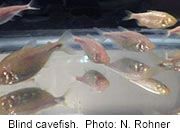
MONDAY, July 13, 2015 (HealthDay News) — A species of fat, binge-eating fish share a specific gene mutation with some obese people who are constantly hungry, a new study shows.
The finding could improve understanding about the link between obesity and health, the researchers said.
They discovered the mutation in the MC4R gene of Mexican cavefish, which have adapted to cycles of starvation and food abundance.
The study, published online July 13 in the journal Proceedings of the National Academy of Sciences, offers new insight into how vertebrates evolved to have different metabolisms from one another.
“We all know that people have different metabolisms that lead to their gaining weight under different amounts of eating,” senior study author Clifford Tabin, chairman of the department of genetics at Harvard Medical School in Boston, said in a university news release.
“The work with the cavefish gives us an example in a natural setting of why and how metabolisms evolved to be different. Some of the mechanisms we see in the fish may well have implications for human metabolism and therefore human health,” he explained.
Cavefish, which are blind, go months without eating by storing huge amounts of fat and burning it more slowly than other fish. While the cavefish are much fatter than other fish, they are healthy.
Learning more about how the cavefish can be so fat but healthy may lead to new ways to help obese people, the researchers noted.
More information
The U.S. National Library of Medicine has more about body weight.
Copyright © 2024 HealthDay. All rights reserved.

